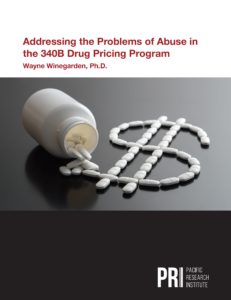Most news coverage focuses on the grandiose – repeal of the Affordable Care Act (aka Obamacare), or whether the U.S. should implement a single payer health care system. These existential questions matter of course – a lot.

Click on the image above to read Wayne Winegarden’s study, “Addressing the Problems of Abuse in the 340B Drug Pricing Program”
Just as often, trivial issues will impact our lives just as much as the grandiose, but rarely receive the attention they deserve. And, when it comes to the problems facing the U.S. health care system, there are many examples of bad government policies that go unrecognized due to their banality.
The 340B program exemplifies this problem.
Under the 340B drug discount program, drug manufacturers offer steep discounts on their medicines to participating hospitals and federal clinics, otherwise Medicaid will not cover the drugs from any non-participating manufacturer. This imposes a mandate on drug manufacturers in all but name.
The discounts are supposed to be restricted to health care providers who serve large numbers of uninsured, low-income, patients. However, the 340B program has gotten off track, and out of control, in recent years. The federal statute governing the program provides limited guidance regarding how it is administered, and because covered entities can prescribe the discounted medicines to anyone who receives medical care at their facilities, including patients who have insurance and pay full price for the medicines, the 340B program creates a very large regulatory-driven profit opportunity.
By exploiting this loophole, many covered entities have turned the 340B program into an important profit driver. This profit-generating mechanism has caused the 340B program to explode in recent years. In 2016 alone, the program was responsible for 5 percent of the entire drug market.
The scope of the 340B program is now so large that it is impacting the broader health care system. For instance,
• Non-340B consumers are paying higher co-pays and out of pocket costs to compensate for the losses incurred from the sales of 340B drugs; and
• The profit potential created by the 340B program has encouraged unwarranted consolidation of community oncology practices leading to higher health care costs because more cancer patients are being transitioned from lower cost physician-office settings to the higher cost hospital settings.
The 340B program requires reforms to reign in the abuses. Toward this end, there is some good news. Reform efforts, such as the 340B PAUSE Act, would help return the program to its original purpose of helping uninsured, low-income, patients afford their medicines.
340B is an obscure government program. Its goal of helping uninsured, low-income, patients afford their medicine is unassailable. But, due to limited oversight and poor implementation, 340B is failing in its primary mission while distorting the broader pharmaceutical market.
Judging 340B on its outcomes, not its intentions, the program is a failure, and requires fundamental reforms.
Wayne Winegarden, Ph.D. is a Sr. Fellow in Business and Economics at the Pacific Research Institute.
